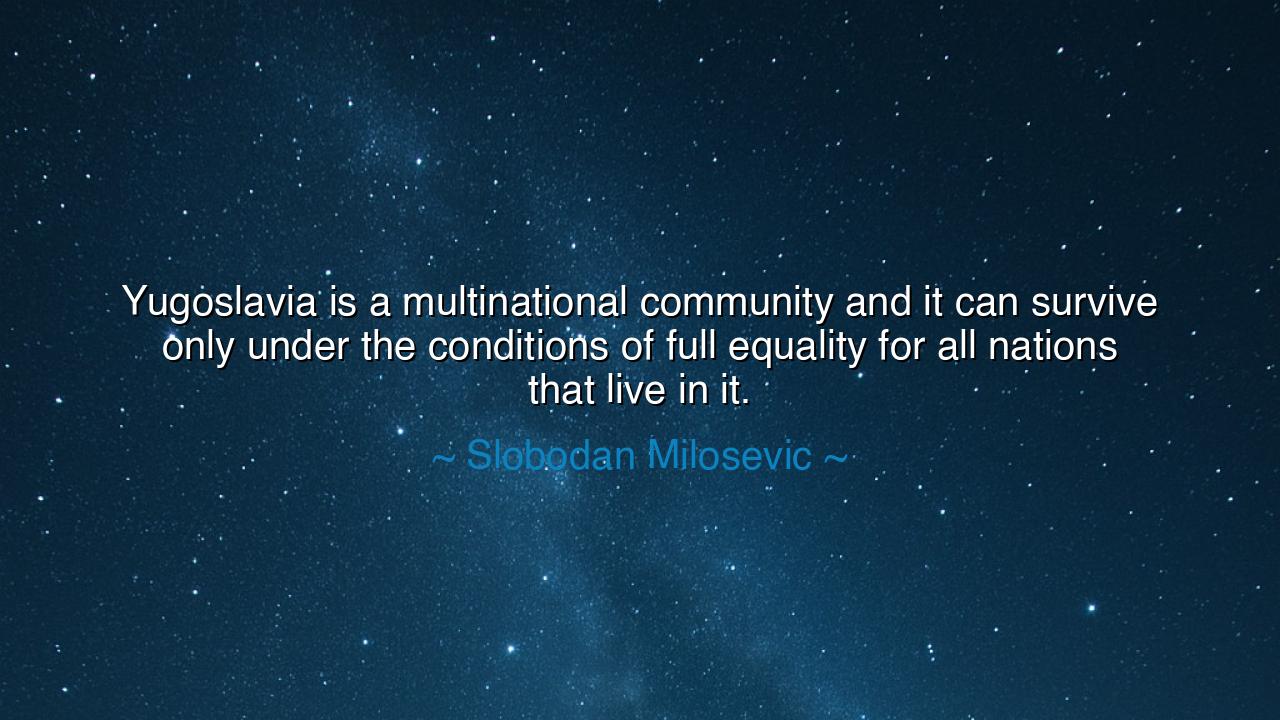
Yugoslavia is a multinational community and it can survive only
Yugoslavia is a multinational community and it can survive only under the conditions of full equality for all nations that live in it.






When Slobodan Milosevic proclaimed, “Yugoslavia is a multinational community and it can survive only under the conditions of full equality for all nations that live in it,” he spoke of a fragile truth that has echoed through the halls of every empire and federation in history. His words, though bound to the turmoil of his time, reveal a principle as old as civilization itself: that where diverse peoples are joined together, equality must be their bond, or division will be their ruin. To ignore this truth is to build a house on sand, shaken apart by storms of envy, distrust, and blood.
The meaning of this quote lies in the recognition that no state, however mighty, can hold together diverse nations by force alone. A multinational community is like a tapestry: each thread retains its own color, but together they form a greater whole. Yet if one color is exalted while others are darkened, the harmony unravels. Milosevic’s statement, at its surface, acknowledges that only full equality—in rights, in dignity, in recognition—can keep such a union alive. For without equality, resentment festers, and resentment is the seed of rebellion.
The origin of these words is rooted in the late 20th century, when Yugoslavia stood as a federation of Serbs, Croats, Slovenes, Bosniaks, Macedonians, Montenegrins, and others—a mosaic of cultures, faiths, and histories. Formed after the First World War and reforged after the Second, Yugoslavia was both promise and peril: promise, in its vision of unity; peril, in its struggle against ancient rivalries. Milosevic, who would later become infamous for fanning the flames of division, nonetheless understood at this early stage that the survival of Yugoslavia rested not on domination, but on shared equality.
History offers us many examples of this truth. Consider the Austro-Hungarian Empire, which brought together Germans, Hungarians, Slavs, and others under one crown. For a time it flourished, but because equality was denied—because some nations were exalted while others were treated as lesser—the empire cracked, collapsing in the fire of the First World War. Its downfall teaches the same lesson Milosevic’s words imply: that a multinational community without justice cannot endure.
And yet, Milosevic’s own path would betray the principle he once named. Instead of cultivating equality, he later pursued power through the exaltation of one nation above others. His name became tied to conflict, war, and division. His failure is a warning written in fire: to speak of equality while denying it in action is to sow disaster. For words that are not lived are worse than silence; they become weapons turned inward, destroying both speaker and people.
The lesson here is plain: wherever many nations, faiths, or peoples dwell together, their survival depends upon justice and equality. No culture, however old; no tribe, however numerous; no nation, however powerful, has the right to rule others as lesser. A true community is forged not in domination but in mutual respect. Equality is not weakness—it is strength, for it transforms many into one without erasing their differences.
What, then, must the listener do? In your own communities, practice the principle that Milosevic declared but later betrayed. Honor the dignity of every person, especially those who differ from you. Build societies where equality is not only a word spoken in speeches, but a law lived in daily life. Where you see oppression, resist it. Where you see division, heal it. For in a world woven from many peoples, equality is the thread that binds us together, and without it, the tapestry of peace will unravel.
Remember always: a multinational community can endure only under full equality. This is not only the lesson of Yugoslavia, but of Rome, of Austria, of every land that has sought to bind together the diverse. Forget this truth, and division will destroy what you seek to preserve. Honor it, and nations may live together not as enemies forced into silence, but as brothers and sisters, strong in their unity, radiant in their diversity.






AAdministratorAdministrator
Welcome, honored guests. Please leave a comment, we will respond soon